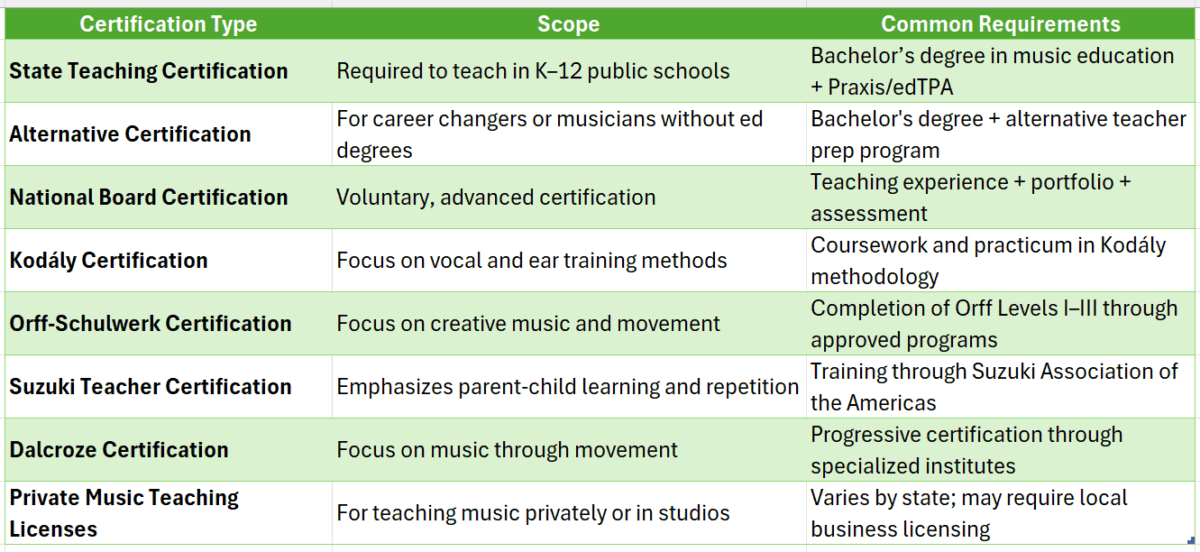
Getting certified as a music teacher in the US is a crucial step for anyone passionate about sharing their love for music. Not only does it validate your skills, but it also opens doors to teaching opportunities in schools. Understanding the importance of music teacher certification can help you navigate this rewarding career path.
Why Certification Matters
- Credibility: Having a music teacher certification shows that you have met specific educational and professional standards.
- Job Opportunities: Many school districts, like HISD, require certification for teaching positions, making it essential for your career.
- Professional Growth: Certification often involves ongoing education, which helps you stay updated with the latest teaching methods and music trends.
Steps to Get Certified
- Complete a Degree: Most states require a bachelor’s degree in music education.
- Pass Exams: You may need to pass state-specific exams to demonstrate your knowledge.
- Apply for Certification: Submit your application to the state education board, like for NC teacher certification renewal, to maintain your credentials.
By following these steps, you can embark on a fulfilling journey as a certified music teacher, inspiring the next generation of musicians.
Unlock your potential with online degrees—Learn more!
What Are the Requirements for Music Teacher Certification?
Getting certified as a music teacher in the US is an important step for anyone passionate about sharing their love of music. Not only does it open doors to teaching opportunities, but it also ensures that you meet the educational standards required by schools. So, what are the requirements for music teacher certification? Let’s dive in!
Basic Educational Requirements
To start your journey, you typically need a bachelor’s degree in music education or a related field. This degree will provide you with the necessary skills and knowledge to teach music effectively. Additionally, many states require you to complete a student teaching internship, which gives you hands-on experience in a classroom setting.
Certification Exams
After completing your degree, you’ll need to pass specific exams. These may include the Praxis Music Content Knowledge test or state-specific assessments. For example, if you’re looking into HISD teacher certification, you’ll need to meet their unique testing requirements. Passing these exams demonstrates your competency in music education and is crucial for certification.
How to Choose the Right Music Education Program
Choosing the right music education program is crucial for aspiring music teachers. It not only shapes your teaching skills but also helps you obtain your music teacher certification. With so many options available, it can feel overwhelming, but understanding what to look for can make the process easier and more enjoyable.
Consider Accreditation
When selecting a program, ensure it is accredited. Accreditation guarantees that the program meets specific educational standards. This is especially important for obtaining your HISD teacher certification or any state certification, like NC teacher certification renewal.
Look for Comprehensive Curriculum
A good music education program should cover various aspects of music, including theory, performance, and pedagogy. This well-rounded approach prepares you for real classroom situations and enhances your teaching abilities.
Check for Student Support
Support services can make a significant difference in your educational journey. Look for programs that offer mentoring, tutoring, and career services. These resources can help you navigate the certification process and find job opportunities after graduation.
Steps to Complete Your Music Teacher Certification Exam
Becoming a certified music teacher in the US is an exciting journey that allows you to share your love for music with students while developing your teaching skills. Here’s how to achieve your music teacher certification step by step.
1. Earn a Degree in Music Education
Start by completing a degree in music education from an accredited program. This will provide you with the essential skills and knowledge needed to teach music effectively.
2. Pass Required Exams
Next, you must pass specific exams, which vary by state. For instance, to obtain HISD teacher certification, you’ll need to pass the Texas Examinations of Educator Standards (TExES).
3. Apply for Certification
After passing your exams, apply for your music teacher certification. This process differs by state but typically involves submitting transcripts, exam scores, and an application. If you’re in North Carolina, remember to consider the NC teacher certification renewal process to maintain your credentials!
4. Gain Classroom Experience
Lastly, gaining classroom experience is essential. Many programs require student teaching, providing you with hands-on experience that builds your confidence and teaching skills.
Exploring Different Types of Music Teacher Certifications

Getting certified as a music teacher in the US is an exciting journey! It opens doors to share your passion for music with students and helps you grow as an educator. Understanding the different types of music teacher certifications can make this process smoother and more enjoyable.
State-Specific Certifications
Each state has its own requirements for music teacher certification. For example, the HISD teacher certification in Texas focuses on preparing educators to meet local standards. Similarly, the NC teacher certification renewal process ensures that teachers in North Carolina stay updated with the latest teaching methods and practices.
National Certifications
In addition to state certifications, there are national programs that offer music teacher certification. These programs often provide a broader perspective and can enhance your teaching credentials. They may also help you stand out in a competitive job market.
Steps to Certification
- Research your state’s requirements.
- Complete a degree in music education.
- Pass required exams.
- Apply for your music teacher certification.
By following these steps, you can embark on a fulfilling career as a music teacher!
How to Prepare for Your Music Teacher Certification Exam
Getting certified as a music teacher in the US is an exciting journey that allows you to share your passion for music with students. However, before entering the classroom, you must prepare for your music teacher certification exam, which ensures you have the necessary skills to inspire young musicians.
Understand the Requirements
Start by familiarizing yourself with your state’s specific requirements. For example, in Texas, you would look into the HISD teacher certification process. Each state has unique rules, so knowing what to expect is vital!
Study Resources
Collect study materials covering music theory, pedagogy, and performance. Joining study groups or online forums can help you share tips and resources with fellow candidates. Additionally, practice exams that mimic the actual test format can be very beneficial.
Practice, Practice, Practice
Lastly, practice your teaching skills through mock lessons or volunteering. Real-world experience will enhance your confidence. Remember, preparing for your NC teacher certification renewal or any certification exam is about building a solid foundation in music education.
Unlock your potential with online degrees—Learn more!
The Role of Student Teaching in Music Teacher Certification
Getting certified as a music teacher in the US is an exciting journey! It opens doors to share your passion for music with students. One crucial step in this process is student teaching, which plays a vital role in your music teacher certification. Let’s explore how this experience shapes future educators.
The Importance of Student Teaching
Student teaching is where theory meets practice. During this time, you get to work alongside experienced teachers, gaining hands-on experience in real classrooms. This is especially important for HISD teacher certification, as it helps you understand the unique needs of diverse students.
Key Benefits of Student Teaching
- Real-World Experience: You learn how to manage a classroom and engage students in music.
- Mentorship: Experienced teachers guide you, providing valuable feedback.
- Networking Opportunities: Building connections can help with your NC teacher certification renewal later on.
In summary, student teaching is an essential part of becoming a certified music teacher, equipping you with the skills and confidence needed to inspire the next generation of musicians.
How CollegeDegree.School Can Support Your Certification Journey
Getting certified as a music teacher in the US is an exciting journey! It opens doors to share your passion for music with students and helps shape their creative futures. Understanding the certification process is crucial, as it varies by state and can impact your teaching career significantly.
Step-by-Step Guidance
- Music Teacher Certification: Start by researching your state’s requirements. Each state has different criteria, so knowing what you need is essential.
- HISD Teacher Certification: If you’re in Houston, the HISD offers specific programs to help you navigate the certification process. They provide resources and support tailored to local needs.
- NC Teacher Certification Renewal: For those in North Carolina, remember that certification isn’t a one-time event.
Keeping your certification active requires renewal, which CollegeDegree.School can help you manage with reminders and resources. With the right support, your path to becoming a certified music teacher can be smooth and enjoyable. Whether you’re just starting or looking to renew your NC teacher certification, CollegeDegree.School is here to guide you every step of the way. Let’s make your dream of teaching music a reality!
Continuing Education: Maintaining Your Music Teacher Certification
Continuing education is essential for music teachers who want to maintain their music teacher certification. Just like musicians practice to improve their skills, teachers must also keep learning to stay current in their field. This ensures they provide the best education possible to their students.
Why Continuing Education Matters
Continuing education helps teachers stay updated on new teaching methods, technology, and curriculum changes. For instance, if you have an HISD teacher certification, you might need to complete specific professional development courses to keep your certification active. This not only enhances your teaching skills but also benefits your students.
Steps for Certification Renewal
- Check Requirements: Each state has different rules. For example, if you’re in North Carolina, you’ll need to focus on NC teacher certification renewal guidelines.
- Complete Professional Development: Engage in workshops, courses, or conferences related to music education.
- Submit Documentation: Keep track of your completed courses and submit them as required for your certification renewal.
By following these steps, you can ensure that your music teacher certification remains valid and that you continue to inspire the next generation of musicians.
Unlock your potential with online degrees—Learn more!
FAQs
1. What degree do I need to become a certified music teacher?
You typically need a bachelor’s degree in music education or a related field that includes a state-approved teacher preparation program.
2. Is a teaching license required to teach music in public schools?
Yes, all public school music teachers must hold a state teaching license with a music endorsement.
3. Do I need to pass exams to get certified as a music teacher?
Yes. Most states require passing a general teaching exam (like Praxis Core) and a subject-specific exam in music education.
4. Can I become a music teacher with a music degree but no education background?
It’s possible through alternative certification programs, which allow degree holders to earn teaching credentials while gaining classroom experience.
5. Are there different certifications for elementary and high school music teachers?
Some states offer separate endorsements (e.g., K–6 and 6–12), while others provide a single K–12 music certification.
6. How do I maintain or renew my music teaching license?
Renewal usually requires professional development hours or continuing education credits, as outlined by your state’s education department.




